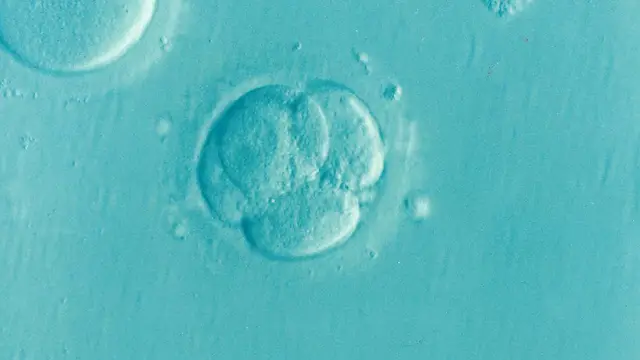Sterile refers to the inability to produce offspring or reproduce, often due to a medical condition. Infertile means incapable of conceiving naturally but doesn’t necessarily imply the inability to reproduce through assisted means.
TL;DR Sterile Vs. Infertile
Being sterile means that a person or couple is completely unable to conceive and produce biological offspring. This could be due to various reasons such as medical conditions, surgical interventions, or genetic abnormalities. Sterility often requires advanced reproductive technologies like surrogacy or adoption as alternative paths towards building a family.
Infertility refers to the inability to achieve pregnancy after actively trying for a certain period of time without success. Infertility can sometimes be temporary and treatable with appropriate medical intervention. It may result from issues such as hormonal imbalances, problems with ovulation or sperm production, or structural abnormalities in reproductive organs.
What is being Sterile?
Being sterile means an individual or organism is incapable of reproducing and producing offspring. This condition can result from various factors, including medical issues, genetic factors, surgical procedures like sterilization, or environmental factors.
Sterility can affect both humans and animals, making it impossible to conceive naturally. In humans, sterility is typically diagnosed when a person or couple is unable to achieve pregnancy after a prolonged period of unprotected sexual intercourse.
Assisted reproductive technologies such as in vitro fertilization (IVF) may offer solutions for some sterile individuals or couples who desire to have children but cannot do so naturally.
What is being Infertile?

Being infertile means a person or organism has a reduced or impaired ability to conceive and reproduce naturally.
This condition can result from various factors, including medical conditions, hormonal imbalances, age-related factors, or lifestyle choices. Infertility may affect individuals or couples, leading to difficulties in achieving pregnancy.
Unlike sterility, infertility does not necessarily imply a complete inability to reproduce but indicates challenges or delays in doing so. Assisted reproductive techniques, such as fertility medications, intrauterine insemination (IUI), or in vitro fertilization (IVF), can sometimes help individuals or couples overcome infertility and have children.
Factors That Contribute to Sterility and Infertility
Factors Contributing to Sterility
- Surgical Sterilization: Sterility can result from surgical procedures like tubal ligation in women or vasectomy in men, where the reproductive organs are intentionally blocked or severed to prevent conception.
- Medical Conditions: Certain medical conditions, such as primary ovarian insufficiency in women or non-obstructive azoospermia in men, can lead to sterility by impairing the function of reproductive organs.
- Genetic Factors: Some genetic conditions can result in sterility, as they may affect the development or functioning of the reproductive system.
- Radiation or Chemotherapy: Exposure to high levels of radiation or specific chemotherapy drugs can damage reproductive tissues, causing sterility.
Factors Contributing to Infertility
- Age: As women age, the quality and quantity of their eggs decrease, leading to reduced fertility. Advanced maternal age can significantly affect the ability to conceive.
- Hormonal Imbalances: Hormonal disorders, such as polycystic ovary syndrome (PCOS) in women or low testosterone levels in men, can disrupt the reproductive process and lead to infertility.
- Lifestyle Factors: Smoking, excessive alcohol consumption, drug use, obesity, and poor nutrition can negatively impact fertility in both men and women.
- Sexual Health: Sexually transmitted infections (STIs) can damage the reproductive organs and cause infertility if left untreated.
- Structural Issues: Conditions like endometriosis in women or varicoceles in men can cause physical obstructions or impair reproductive organ function, leading to infertility.
- Stress and Psychological Factors: High levels of stress and psychological factors can affect hormonal balance and ovulation in women, potentially leading to infertility.
- Environmental Factors: Exposure to environmental toxins, pesticides, and pollutants may disrupt the reproductive system and contribute to infertility.
- Unexplained Infertility: In some cases, despite thorough testing, the cause of infertility remains unexplained, making it challenging to identify specific factors.
It’s essential for individuals or couples experiencing sterility or infertility to consult with healthcare professionals, such as fertility specialists, to determine the underlying causes and explore potential treatment options, which may include medical interventions, lifestyle changes, or assisted reproductive technologies.
Sterile Vs. Infertile – Key differences
| Aspect | Sterile | Infertile |
|---|---|---|
| Definition | Complete inability to reproduce or produce offspring. | Reduced or impaired ability to conceive naturally. |
| Reproductive Organs | Typically, reproductive organs are intentionally blocked or severed (e.g., surgical sterilization). | Reproductive organs are usually intact but may have functional issues. |
| Surgical Procedures | Often the result of surgical procedures like tubal ligation (women) or vasectomy (men). | Not a result of surgical procedures to intentionally block reproduction. |
| Medical Conditions | Can result from certain medical conditions or genetic factors that severely impair reproductive function. | Typically linked to medical conditions, hormonal imbalances, or age-related factors. |
| Potential for Assistance | May not have options for assisted reproduction; infertility treatments may not be effective. | Assisted reproductive techniques, such as IVF, may offer possibilities for conception. |
| Natural Conception | Natural conception is highly unlikely or impossible. | Conception may be challenging but not impossible through natural means. |
| Examples | Vasectomy, bilateral salpingectomy. | Polycystic ovary syndrome (PCOS), male low sperm count. |
| Psychological Impact | May lead to acceptance of permanent childlessness. | Often involves emotional stress and the desire to seek solutions for conception. |
The Importance of Seeking Professional Help
Seeking professional help is crucial in various aspects of life, including physical and mental health, legal matters, financial planning, and more. Here are some reasons highlighting the importance of seeking professional assistance:
- Expertise and Knowledge: Professionals have specialized training and expertise in their respective fields. They possess knowledge that can help individuals or organizations navigate complex issues and make informed decisions.
- Accurate Assessment: Professionals can provide accurate assessments of situations or conditions. In healthcare, for example, a doctor can diagnose and treat medical conditions accurately, leading to better health outcomes.
- Tailored Solutions: Professionals can tailor solutions to individual needs. Whether it’s a therapist customizing a mental health treatment plan or a financial advisor creating a personalized investment strategy, professionals consider unique circumstances.
- Legal Compliance: In legal matters, professionals ensure compliance with laws and regulations. This is crucial to avoid legal issues, penalties, or consequences.
- Risk Mitigation: Professionals help identify and mitigate risks. In fields like insurance or cybersecurity, experts can protect individuals and organizations from potential threats.
- Efficiency and Time Savings: Seeking professional help can save time and effort. Professionals can streamline processes, making them more efficient and less prone to errors.
- Conflict Resolution: Professionals can mediate and resolve conflicts impartially. In legal disputes, for example, attorneys can negotiate settlements to avoid protracted litigation.
- Mental Health Support: Mental health professionals provide emotional support and therapeutic interventions to manage conditions like depression, anxiety, and trauma, improving overall well-being.
- Financial Guidance: Financial advisors help with budgeting, investments, retirement planning, and debt management, ensuring financial security and future goals.
- Learning and Growth: Professionals often educate and empower clients. They provide information and tools that individuals can use to improve their own skills and decision-making abilities.
- Quality Assurance: Professionals maintain high standards and codes of ethics, ensuring quality and safety in their services.
- Peace of Mind: Consulting professionals can provide peace of mind, knowing that issues are being addressed competently and professionally.
In many areas of life, seeking professional help can lead to better outcomes, greater efficiency, and enhanced well-being. It is a proactive step toward addressing challenges, achieving goals, and ensuring a higher quality of life.
Image Credits
Featured Image By – Elena Έλενα Kontogianni Κοντογιάννη from Pixabay
Image 1 By – Elena Έλενα Kontogianni Κοντογιάννη from Pixabay








